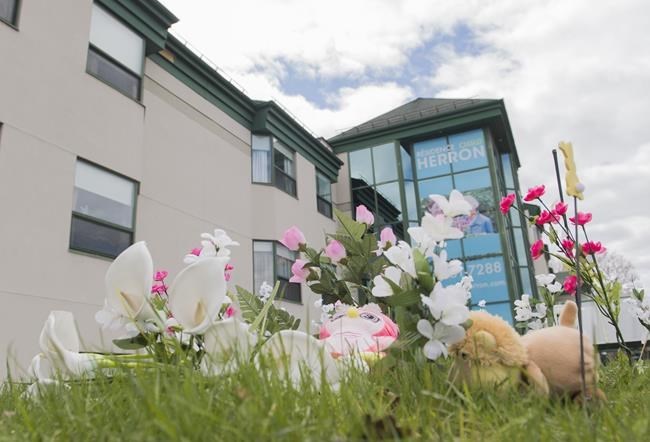MONTREAL — A nurse sent to evaluate the quality of care at a suburban Montreal long-term care home where 47 people died during the first wave of COVID-19 found numerous failings, a Quebec coroner's inquest heard Thursday.
Stéphanie Larose, a nurse and head of outpatient care at the local health authority, was asked to evaluate Résidence Herron on April 3, 2020, and put a crisis team in place to manage the facility. She spent 11 days at the residence.
She told the coroner's inquiry looking into deaths in long-term care homes there were a number of issues noted by previous witnesses — a lack of personal protective equipment, a lack of qualified staff to care for patients and outdated patient records and charts.
She noted medical equipment did not have batteries and even things like toilet paper and soap weren't available, necessitating an emergency run to a grocery store.
Larose, a nurse with 30 years' experience, recounted that she began helping patients even though she'd been sent to evaluate the situation. She noted some were so thirsty they guzzled down water by the cupful.
"Ethically speaking, it was very hard see people suffering," she said.
She recounted the case of one man who was near the end of life who was covered in sores and yellowing bandages and whose oxygen tank was empty.
"He was an athlete, a marathon runner," Larose said, holding back tears. "He had pictures of himself in races on the walls, and this is how he ended up."
She said another resident didn't believe her when she told her she'd help her get back to her bed after taking her to the toilet. The woman told Larose she was often left alone and would fall to the ground because it was better to lie down than remain sitting in pain. Larose said the resident asked for two diapers because she was used to being left for hours.
Larose also found that during an audit of one floor, there were no designated COVID-19 zones. Some residents were wrongly identified as having the disease, while others who did have COVID-19 were identified as virus-free.
The testimony is part of coroner Géhane Kamel's ongoing probe examining 53 deaths at six long-term care homes and one seniors residence during the pandemic's first wave.
Earlier Thursday, the coroner's inquest heard from a retired manager who was informed of the situation at Herron early on March 29, 2020, after two residents were transferred to hospital.
Brigitte Auger, who was director of a support program for seniors at the health authority, joined colleagues to see for herself and help as much as she could. Auger noted that most elder care facilities were experiencing staffing shortages at the time due to COVID-19, but she was unprepared for what she saw at Herron, calling it a first in her 35-year career as an administrator.
“It’s impossible that missing people for one day, that a residence would be in a situation like this," Auger said, adding in her opinion, there hadn't been adequate staff for several days.
Auger would become the regional health authority's appointed manager and go-between with Samantha Chowieri, the owner of the residence, whom she found on the first day struggling to find staff as the usual manager was home ill with COVID-19.
"I didn't think she acted in bad faith," Auger said. "I had the impression she was completely overwhelmed by the situation."
When Auger arrived around dinner on March 29, she was met with sombre silence and empty, dark hallways on the third floor. A smell permeated the building, the floors were sticky and there were food trays left out. Because there were no designated COVID-19 zones, she treated each patient as though they were infected.
Despite having no nursing experience, she recounted spending several hours with a pair of orderlies, going from room to room to reassure residents and help anyway she could, from changing soiled diapers and sheets to providing yogurt and water.
Each door had a name and photo identifying the occupant. Auger said she isn't religious, but she would make the sign of the cross before entering the rooms, praying the person inside was alive.
Hearings involving Herron began Tuesday after the Crown decided it wouldn't pursue criminal charges against the owners of the now-closed facility.
This report by The Canadian Press was first published Sept. 9, 2021.
Sidhartha Banerjee, The Canadian Press



